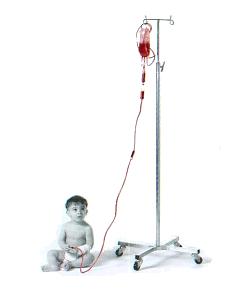'Midwifery Matters' Autumn '08 - article on NBS restructuring
This is an article by Morag Forbes published in the Autumn '08 issue of 'Midwifery Matters'.
Restructuring of Britain’s National Blood Services:
Why we should care, and what we can do!
Author’s note: At first sight, this article may seem “off topic” for Midwifery Matters. I decided to write it after hearing from friends working in the blood service. While their job is different to ours, many of the same themes are emerging – cuts, increasing centralisation, and devaluing of staff. And, as you will see, cuts in the blood service will directly affect the care we offer to women.

What is the NBS? What does it do?
England’s National Blood Service (NBS) is over 60 years old. This specialised service collects, tests and processes blood products. Its local nature is essential – local labs understand the needs of local health services.
What are the restructuring plans?
NBS management plan to close local labs across England, replacing them with “supercentres”. Around 600 jobs (roughly half the NBS workforce) would be lost in the process. NBS staff have not been consulted on their opinions of what would constitute a safe and efficient service structure.
Has there been opposition to the plans?
The plans are widely opposed by unions, city councils, NBS staff, and service users. This prompted a review of the plans. In North and Southeast England, the “supercentre” idea has been abandoned. Some local centres have been saved, or have retained functions that were to be cut.
However, many NBS centres are still threatened. Processing and/or testing labs are to be closed at Leeds, Tooting, Brentwood, Birmingham, Southampton and Plymouth. RCI Reference Labs, which crossmatch blood for rare/reactive blood types, will close in Manchester, Southampton and Cambridge. Many services will be moved to a “supercentre” at Bristol.
These plans still mean at least 600 redundancies in the service.
What about the rest of the UK?
The supercentre plan, discredited, but still rumbling on in the South West has now made its way to Scotland too, with plans to close Glasgow and Edinburgh blood centres in the Scottish National Blood Transfusion Service. One ‘super’ facility for the whole of the central belt, would take blood processing away from local communities.
How will this affect healthcare?
NBS staff have severe concerns about the plans’ implications for safe healthcare.
As services become more centralised, blood products must be transported for hundreds of miles, on a potentially unreliable motorway network. Rare blood products may not be available quickly in emergency situations. Longer transport times will mean blood products spend longer in suboptimal storage conditions.
Redundancies in the blood donation service may prove critical, with donation levels already seriously low.
How will this affect maternity care?
All midwives know the importance of speedy access to blood products in emergencies: it may literally be the difference between life and death for a mother or her newborn.
This is especially true for ill babies. Split platelets for newborns are always made to demand, to avoid wastage, and very often wanted in a short time scale. For example, Birmingham Women’s Hospital currently obtains split platelets from a lab within walking distance. Split platelets can be made from adult platelets to be available immediately. If services are centralised to Bristol, Birmingham will have to stock ready-split platelets. These will go in the bin if not used within 4 days (extra travelling time means they lose a day of their 5-day shelf life!). Otherwise, staff will have to phone an order to Bristol, and wait for the appropriate platelets to be sourced, processed and sent along the motorway. It’s easy to see how disastrous this could be.
On a less dramatic level, the next phase of cuts will see the NBS decrease its role in antenatal screening from 2011. This makes no economic sense, when the NBS can perform screening tests at a much lower cost than individual hospitals can. As radical midwives, we may question the routine use of screening. However, for families who choose these services, they should surely be available locally and at minimum cost to the NHS.
What can I do?
- Keep up to date at http://nbs-sos.blogspot.com
- Spread the word to local/national media, other healthcare professionals and service users.
- Ask your city council to pass a resolution opposing the plans. This has already happened in many areas.
- Raise the issue via your local Public and Patient Involvement Forum
'Midwifery Matters' is the magazine of ARM (The Association of Radical Midwives). The magazine is only available to members, but can also be found in some university libraries. Visit ARM's website here, and read more articles from previous issues of MM here.
Labels: About the NBS, press cuttings









